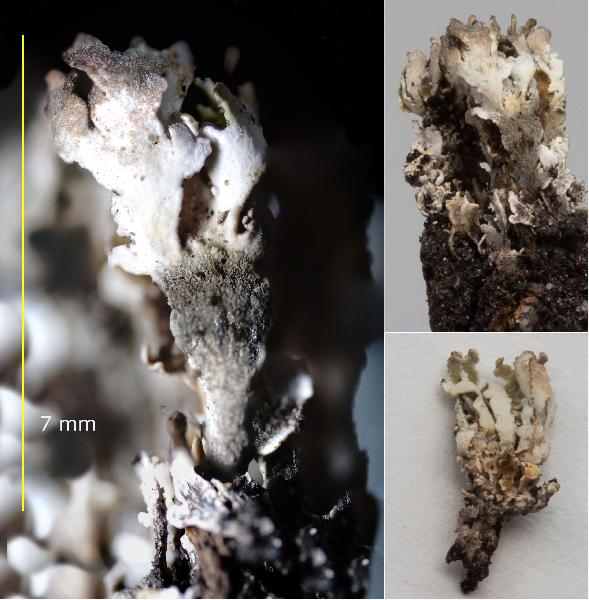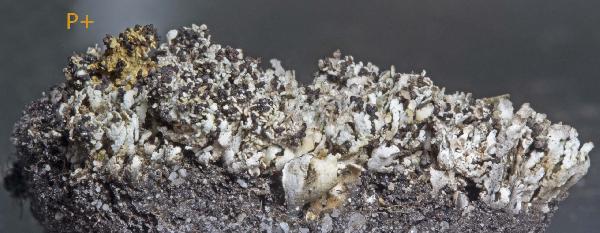Cladonia subcervicornis (Vain.) Kernst.
Jahresber. Staatsoberrealschule Klagenfurt, 43: 25, 1900. Basionym: Cladonia verticillata var. subcervicornis Vain. - Acta Soc. Fauna Fl. Fenn., 10: 197, 1894.
Synonyms:
Distribution: N - Ven, Piem (Isocrono & al. 2006, 2006b), Lig. C - Tosc (Brackel 2015), Sar. S - Camp (Ravera & al. 2019a), Cal (Puntillo 1996).
Description: Primary thallus squamulose, prominent and persistent, forming cushions, the squamules ascending, large, 0.5-1(-3) cm long and 2-4(-5) mm wide, with an entire to weakly indented margin, bluish green to grey-green above, at first white but soon lead grey beneath at least in the lower half, often with strongly melanotic spots near the attachment point. Podetia rare, 5-6 mm tall, 1-2 mm thick, hollow inside, with funnel-shaped, rapidly flaring, irregular cups which sometimes proliferate from the centre or from the margins, lead grey to grey-green, melanotic at base, often phyllopodiate, with a more or less continuous or areolate cortex. Apothecia rather rare, dark brown, convex, often clustered, originating from the margins of the cups. Asci 8-spored, clavate, thickened at apex, with a K/I+ blue tholus and a K/I+ strongly blue outer gelatinous sheath, Cladonia-type. Ascospores 1-celled, hyaline, ellipsoid. Pycnidia dark, subglobose to ovoid, semi-immersed on the margins of cups, with a colourless jelly. Conidia hyaline, curved. Photobiont chlorococcoid. Spot tests: K+ yellow sometimes slowly turning brown, C-, KC-, P+ red, UV-. Chemistry: fumarprotocetraric acid complex and atranorin.Note: on siliceous rocks and on soil rich in humus in open habitats; probably more widespread in Tyrrhenian Italy. The records from Piedmont and Lombardy by Valcuvia (2002, 2002b) are rather dubious.
Growth form: Fruticose
Substrata: soil, terricolous mosses, and plant debris
Photobiont: green algae other than Trentepohlia
Reproductive strategy: mainly sexual
Most common in areas with a humid-warm climate (e.g. most of Tyrrenian Italy)
Commonnes-rarity: (info)
Alpine belt: absent
Subalpine belt: absent
Oromediterranean belt: absent
Montane belt: extremely rare
Submediterranean belt: extremely rare
Padanian area: absent
Humid submediterranean belt: very rare
Humid mediterranean belt: rare
Dry mediterranean belt: absent

Predictive model
Herbarium samples

Courtesy Danièle et Olivier Gonnet - Source: https://www.afl-lichenologie.fr/Photos_AFL/Photos_AFL_C/Textes_C2/Cladonia_subcervicornis.htm
Bocca di Petraiolu - Corse
2/10/2010


Felix Schumm – CC BY-SA 4.0
[9360], Spanien, Kanarische Inseln, La Gomera, Los Barranquillos nordöstlich von Arure an der Strasse nach Vallehermoso im Lorbeerwald. 28°09.150’ N, 17°18.299’ W, 1015 m. Leg. Schumm 13.02.2002, det. Schumm 2013.


Felix Schumm – CC BY-SA 4.0
[9360], Spanien, Kanarische Inseln, La Gomera, Los Barranquillos nordöstlich von Arure an der Strasse nach Vallehermoso im Lorbeerwald. 28°09.150’ N, 17°18.299’ W, 1015 m. Leg. Schumm 13.02.2002, det. Schumm 2013.,
HPTLC in den Laufmitteln A, B’ und C nach Säurebehandlung bei Tageslicht und 366 nm UV-Langwelle. 1: Start, 4: Position von Norstictinsäure, 7: Position von Atranorin, at: Atranorin, pr: Protocetrarsäure, fpr: Fumarprotocetrarsäure

Courtesy Danièle et Olivier Gonnet - Source: https://www.afl-lichenologie.fr/Photos_AFL/Photos_AFL_C/Textes_C2/Cladonia_subcervicornis.htm
Bocca di Petraiolu - Corse
2/10/2010


Felix Schumm – CC BY-SA 4.0
[9360], Spanien, Kanarische Inseln, La Gomera, Los Barranquillos nordöstlich von Arure an der Strasse nach Vallehermoso im Lorbeerwald. 28°09.150’ N, 17°18.299’ W, 1015 m. Leg. Schumm 13.02.2002, det. Schumm 2013.

Courtesy Danièle et Olivier Gonnet - Source: https://www.afl-lichenologie.fr/Photos_AFL/Photos_AFL_C/Textes_C2/Cladonia_subcervicornis.htm
Bocca di Petraiolu - Corse
2/10/2010

Bernard Bouffinier- Source: http://www.lichensmaritimes.org/index.php?task=fiche&lichen=150&lang=en
France, Crozon

Bernard Bouffinier- Source: http://www.lichensmaritimes.org/index.php?task=fiche&lichen=150&lang=en
France, Crozon

Bernard Bouffinier- Source: http://www.lichensmaritimes.org/index.php?task=fiche&lichen=150&lang=en
France, Goulien

Bernard Bouffinier- Source: http://www.lichensmaritimes.org/index.php?task=fiche&lichen=150&lang=en
France, Goulien

Bernard Bouffinier- Source: http://www.lichensmaritimes.org/index.php?task=fiche&lichen=150&lang=en
France, Pointe de Pen-Hir

Michel David - Source: http://www.lichensmaritimes.org/index.php?task=fiche&lichen=150&lang=en
France, Frat

Michel David - Source: http://www.lichensmaritimes.org/index.php?task=fiche&lichen=150&lang=en
France, Roscanvel

Michel David - Source: http://www.lichensmaritimes.org/index.php?task=fiche&lichen=150&lang=en
France, Roscanvel

Michel David - Source: http://www.lichensmaritimes.org/index.php?task=fiche&lichen=150&lang=en
France, Roscanvel

Michel David - Source: http://www.lichensmaritimes.org/index.php?task=fiche&lichen=150&lang=en
France, Roscanvel

Arnaud Delhoume - Source: http://www.lichensmaritimes.org/index.php?task=fiche&lichen=150&lang=en
France, Pointe de Dinan

Bernard Bouffinier - Source: http://www.lichensmaritimes.org/index.php?task=fiche&lichen=150&lang=en
France, Cap de la Chèvre

Michel David - Source: http://www.lichensmaritimes.org/index.php?task=fiche&lichen=150&lang=en
France, Fraternitè

Michel David - Source: http://www.lichensmaritimes.org/index.php?task=fiche&lichen=150&lang=en
France, Fraternitè

Bernard Bouffinier - Source: http://www.lichensmaritimes.org/index.php?task=fiche&lichen=927&lang=en
France, Porz Kreguen
juvenile form

Bernard Bouffinier - Source: http://www.lichensmaritimes.org/index.php?task=fiche&lichen=927&lang=en
France, Menez, Kador
juvenile form

Bernard Bouffinier - Source: http://www.lichensmaritimes.org/index.php?task=fiche&lichen=927&lang=en
France, Menez, Kador
juvenile form

Bernard Bouffinier - Source: http://www.lichensmaritimes.org/index.php?task=fiche&lichen=927&lang=en
France, Menez, Kador
juvenile form

Bernard Bouffinier - Source: http://www.lichensmaritimes.org/index.php?task=fiche&lichen=927&lang=en
France, Menez, Kador
juvenile form
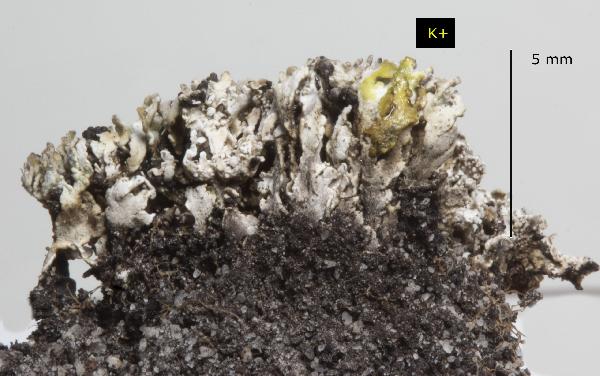
Marta González Garcia - Centro de Estudios Micologicos Asturianos
Spain, La Farrapona (Somiedo-Asturias), 30-V-2024, en el suelo, junto a Trapeliopsis granulosa bajo enebrales rastreros, a 1.800 m de altitud, MGG-4.
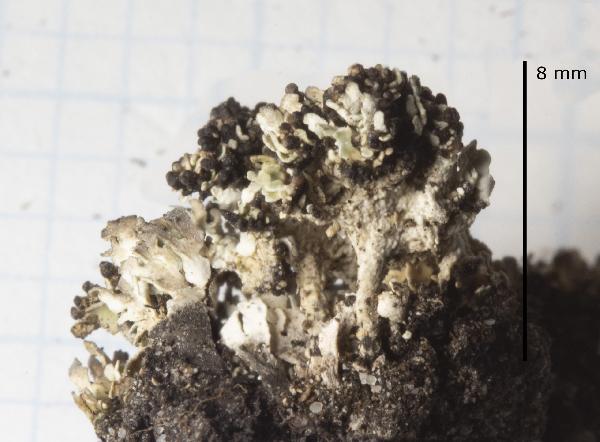
Marta González Garcia - Centro de Estudios Micologicos Asturianos
Spain, La Farrapona (Somiedo-Asturias), 30-V-2024, en el suelo, junto a Trapeliopsis granulosa bajo enebrales rastreros, a 1.800 m de altitud, MGG-4.
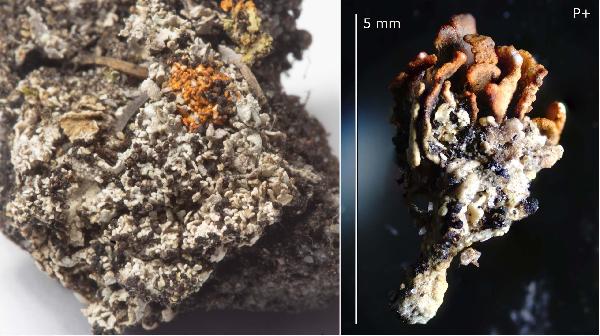
Marta González Garcia - Centro de Estudios Micologicos Asturianos
Spain, La Farrapona (Somiedo-Asturias), 30-V-2024, en el suelo, junto a Trapeliopsis granulosa bajo enebrales rastreros, a 1.800 m de altitud, MGG-4.
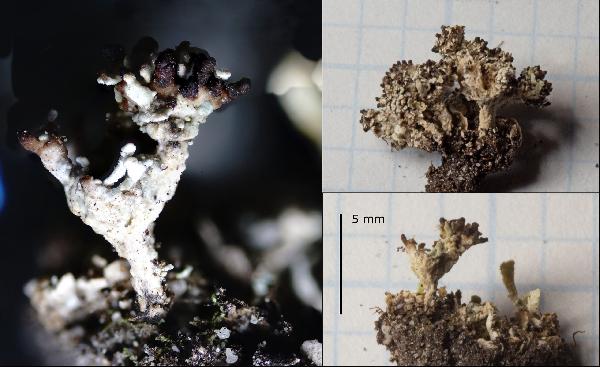
Marta González Garcia - Centro de Estudios Micologicos Asturianos
Spain, La Farrapona (Somiedo-Asturias), 30-V-2024, en el suelo, junto a Trapeliopsis granulosa bajo enebrales rastreros, a 1.800 m de altitud, MGG-4.
Growth form: Fruticose
Substrata: soil, terricolous mosses, and plant debris
Photobiont: green algae other than Trentepohlia
Reproductive strategy: mainly sexual
Most common in areas with a humid-warm climate (e.g. most of Tyrrenian Italy)
Commonnes-rarity: (info)
Alpine belt: absent
Subalpine belt: absent
Oromediterranean belt: absent
Montane belt: extremely rare
Submediterranean belt: extremely rare
Padanian area: absent
Humid submediterranean belt: very rare
Humid mediterranean belt: rare
Dry mediterranean belt: absent

Predictive model
| Herbarium samples |

Courtesy Danièle et Olivier Gonnet - Source: https://www.afl-lichenologie.fr/Photos_AFL/Photos_AFL_C/Textes_C2/Cladonia_subcervicornis.htm
Bocca di Petraiolu - Corse
2/10/2010


Felix Schumm – CC BY-SA 4.0
[9360], Spanien, Kanarische Inseln, La Gomera, Los Barranquillos nordöstlich von Arure an der Strasse nach Vallehermoso im Lorbeerwald. 28°09.150’ N, 17°18.299’ W, 1015 m. Leg. Schumm 13.02.2002, det. Schumm 2013.


Felix Schumm – CC BY-SA 4.0
[9360], Spanien, Kanarische Inseln, La Gomera, Los Barranquillos nordöstlich von Arure an der Strasse nach Vallehermoso im Lorbeerwald. 28°09.150’ N, 17°18.299’ W, 1015 m. Leg. Schumm 13.02.2002, det. Schumm 2013.,
HPTLC in den Laufmitteln A, B’ und C nach Säurebehandlung bei Tageslicht und 366 nm UV-Langwelle. 1: Start, 4: Position von Norstictinsäure, 7: Position von Atranorin, at: Atranorin, pr: Protocetrarsäure, fpr: Fumarprotocetrarsäure

Courtesy Danièle et Olivier Gonnet - Source: https://www.afl-lichenologie.fr/Photos_AFL/Photos_AFL_C/Textes_C2/Cladonia_subcervicornis.htm
Bocca di Petraiolu - Corse
2/10/2010


Felix Schumm – CC BY-SA 4.0
[9360], Spanien, Kanarische Inseln, La Gomera, Los Barranquillos nordöstlich von Arure an der Strasse nach Vallehermoso im Lorbeerwald. 28°09.150’ N, 17°18.299’ W, 1015 m. Leg. Schumm 13.02.2002, det. Schumm 2013.

Courtesy Danièle et Olivier Gonnet - Source: https://www.afl-lichenologie.fr/Photos_AFL/Photos_AFL_C/Textes_C2/Cladonia_subcervicornis.htm
Bocca di Petraiolu - Corse
2/10/2010

Bernard Bouffinier- Source: http://www.lichensmaritimes.org/index.php?task=fiche&lichen=150&lang=en
France, Crozon

Bernard Bouffinier- Source: http://www.lichensmaritimes.org/index.php?task=fiche&lichen=150&lang=en
France, Crozon

Bernard Bouffinier- Source: http://www.lichensmaritimes.org/index.php?task=fiche&lichen=150&lang=en
France, Goulien

Bernard Bouffinier- Source: http://www.lichensmaritimes.org/index.php?task=fiche&lichen=150&lang=en
France, Goulien

Bernard Bouffinier- Source: http://www.lichensmaritimes.org/index.php?task=fiche&lichen=150&lang=en
France, Pointe de Pen-Hir

Michel David - Source: http://www.lichensmaritimes.org/index.php?task=fiche&lichen=150&lang=en
France, Frat

Michel David - Source: http://www.lichensmaritimes.org/index.php?task=fiche&lichen=150&lang=en
France, Roscanvel

Michel David - Source: http://www.lichensmaritimes.org/index.php?task=fiche&lichen=150&lang=en
France, Roscanvel

Michel David - Source: http://www.lichensmaritimes.org/index.php?task=fiche&lichen=150&lang=en
France, Roscanvel

Michel David - Source: http://www.lichensmaritimes.org/index.php?task=fiche&lichen=150&lang=en
France, Roscanvel

Arnaud Delhoume - Source: http://www.lichensmaritimes.org/index.php?task=fiche&lichen=150&lang=en
France, Pointe de Dinan

Bernard Bouffinier - Source: http://www.lichensmaritimes.org/index.php?task=fiche&lichen=150&lang=en
France, Cap de la Chèvre

Michel David - Source: http://www.lichensmaritimes.org/index.php?task=fiche&lichen=150&lang=en
France, Fraternitè

Michel David - Source: http://www.lichensmaritimes.org/index.php?task=fiche&lichen=150&lang=en
France, Fraternitè

Bernard Bouffinier - Source: http://www.lichensmaritimes.org/index.php?task=fiche&lichen=927&lang=en
France, Porz Kreguen
juvenile form

Bernard Bouffinier - Source: http://www.lichensmaritimes.org/index.php?task=fiche&lichen=927&lang=en
France, Menez, Kador
juvenile form

Bernard Bouffinier - Source: http://www.lichensmaritimes.org/index.php?task=fiche&lichen=927&lang=en
France, Menez, Kador
juvenile form

Bernard Bouffinier - Source: http://www.lichensmaritimes.org/index.php?task=fiche&lichen=927&lang=en
France, Menez, Kador
juvenile form

Bernard Bouffinier - Source: http://www.lichensmaritimes.org/index.php?task=fiche&lichen=927&lang=en
France, Menez, Kador
juvenile form

Marta González Garcia - Centro de Estudios Micologicos Asturianos
Spain, La Farrapona (Somiedo-Asturias), 30-V-2024, en el suelo, junto a Trapeliopsis granulosa bajo enebrales rastreros, a 1.800 m de altitud, MGG-4.

Marta González Garcia - Centro de Estudios Micologicos Asturianos
Spain, La Farrapona (Somiedo-Asturias), 30-V-2024, en el suelo, junto a Trapeliopsis granulosa bajo enebrales rastreros, a 1.800 m de altitud, MGG-4.

Marta González Garcia - Centro de Estudios Micologicos Asturianos
Spain, La Farrapona (Somiedo-Asturias), 30-V-2024, en el suelo, junto a Trapeliopsis granulosa bajo enebrales rastreros, a 1.800 m de altitud, MGG-4.

 INDEX FUNGORUM
INDEX FUNGORUM
 GBIF
GBIF
 DOLICHENS
DOLICHENS




